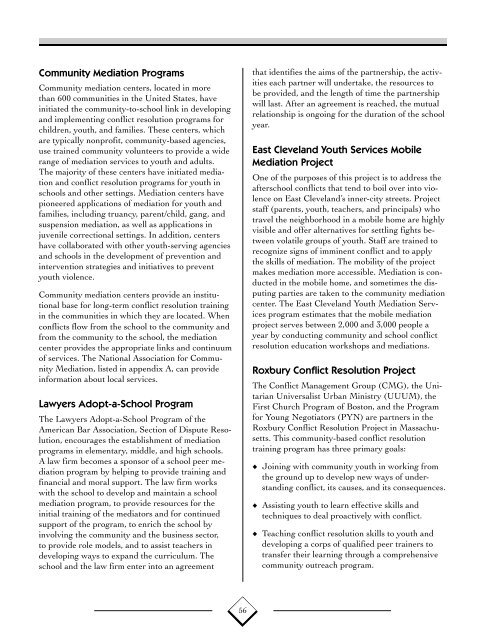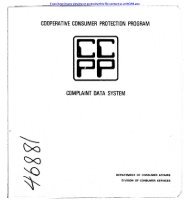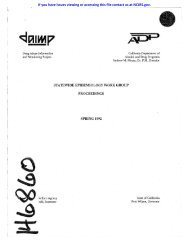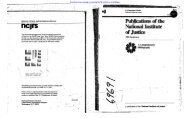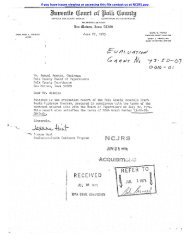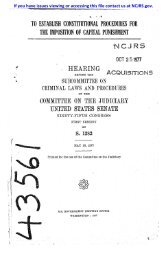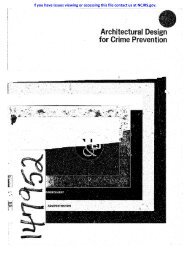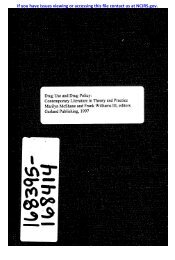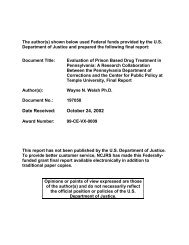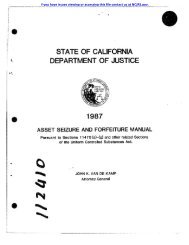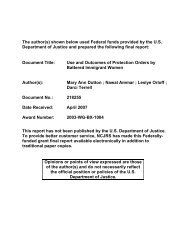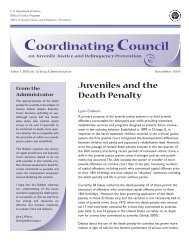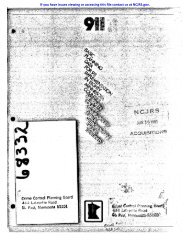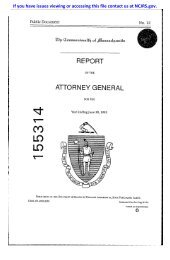Conflict Resolution Education - National Criminal Justice Reference ...
Conflict Resolution Education - National Criminal Justice Reference ...
Conflict Resolution Education - National Criminal Justice Reference ...
Create successful ePaper yourself
Turn your PDF publications into a flip-book with our unique Google optimized e-Paper software.
Community Mediation Programs<br />
Community mediation centers, located in more<br />
than 600 communities in the United States, have<br />
initiated the community-to-school link in developing<br />
and implementing conflict resolution programs for<br />
children, youth, and families. These centers, which<br />
are typically nonprofit, community-based agencies,<br />
use trained community volunteers to provide a wide<br />
range of mediation services to youth and adults.<br />
The majority of these centers have initiated mediation<br />
and conflict resolution programs for youth in<br />
schools and other settings. Mediation centers have<br />
pioneered applications of mediation for youth and<br />
families, including truancy, parent/child, gang, and<br />
suspension mediation, as well as applications in<br />
juvenile correctional settings. In addition, centers<br />
have collaborated with other youth-serving agencies<br />
and schools in the development of prevention and<br />
intervention strategies and initiatives to prevent<br />
youth violence.<br />
Community mediation centers provide an institutional<br />
base for long-term conflict resolution training<br />
in the communities in which they are located. When<br />
conflicts flow from the school to the community and<br />
from the community to the school, the mediation<br />
center provides the appropriate links and continuum<br />
of services. The <strong>National</strong> Association for Community<br />
Mediation, listed in appendix A, can provide<br />
information about local services.<br />
Lawyers Adopt-a-School Program<br />
The Lawyers Adopt-a-School Program of the<br />
American Bar Association, Section of Dispute <strong>Resolution</strong>,<br />
encourages the establishment of mediation<br />
programs in elementary, middle, and high schools.<br />
A law firm becomes a sponsor of a school peer mediation<br />
program by helping to provide training and<br />
financial and moral support. The law firm works<br />
with the school to develop and maintain a school<br />
mediation program, to provide resources for the<br />
initial training of the mediators and for continued<br />
support of the program, to enrich the school by<br />
involving the community and the business sector,<br />
to provide role models, and to assist teachers in<br />
developing ways to expand the curriculum. The<br />
school and the law firm enter into an agreement<br />
56<br />
that identifies the aims of the partnership, the activities<br />
each partner will undertake, the resources to<br />
be provided, and the length of time the partnership<br />
will last. After an agreement is reached, the mutual<br />
relationship is ongoing for the duration of the school<br />
year.<br />
East Cleveland Youth Services Mobile<br />
Mediation Project<br />
One of the purposes of this project is to address the<br />
afterschool conflicts that tend to boil over into violence<br />
on East Cleveland’s inner-city streets. Project<br />
staff (parents, youth, teachers, and principals) who<br />
travel the neighborhood in a mobile home are highly<br />
visible and offer alternatives for settling fights between<br />
volatile groups of youth. Staff are trained to<br />
recognize signs of imminent conflict and to apply<br />
the skills of mediation. The mobility of the project<br />
makes mediation more accessible. Mediation is conducted<br />
in the mobile home, and sometimes the disputing<br />
parties are taken to the community mediation<br />
center. The East Cleveland Youth Mediation Services<br />
program estimates that the mobile mediation<br />
project serves between 2,000 and 3,000 people a<br />
year by conducting community and school conflict<br />
resolution education workshops and mediations.<br />
Roxbury <strong>Conflict</strong> <strong>Resolution</strong> Project<br />
The <strong>Conflict</strong> Management Group (CMG), the Unitarian<br />
Universalist Urban Ministry (UUUM), the<br />
First Church Program of Boston, and the Program<br />
for Young Negotiators (PYN) are partners in the<br />
Roxbury <strong>Conflict</strong> <strong>Resolution</strong> Project in Massachusetts.<br />
This community-based conflict resolution<br />
training program has three primary goals:<br />
♦ Joining with community youth in working from<br />
the ground up to develop new ways of understanding<br />
conflict, its causes, and its consequences.<br />
♦ Assisting youth to learn effective skills and<br />
techniques to deal proactively with conflict.<br />
♦ Teaching conflict resolution skills to youth and<br />
developing a corps of qualified peer trainers to<br />
transfer their learning through a comprehensive<br />
community outreach program.


